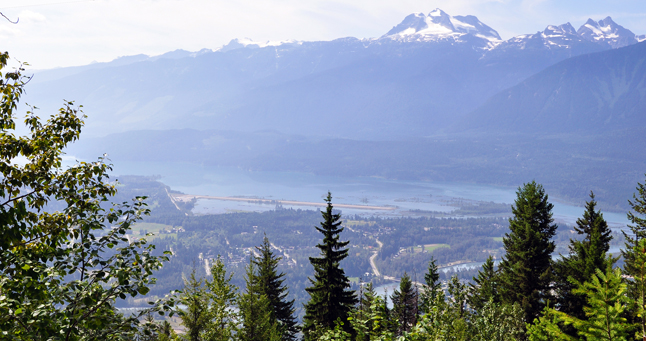
By David F. Rooney
Climate change. Everybody’s heard about it and some likely think it’s not real, but according to the Columbia Basin Trust’s latest report, From Dialogue to Action, we are already in the midst of it. And there’s no turning back.
“Observations confirm that the Basin climate has changed,” says the report, which was publicly released last week. “The Pacific Climate Impacts Consortium’s (PCIC’s) most recent review of historical records from weather stations across the Basin—which have records that span most of the past century—found that the average recorded annual temperature has increased over the last century by 0.7° C to 1.7° C. Rates of warming have been higher at night and in winter.9,* This warming has resulted in a considerably longer frost-free period, on average.”
The University of Victoria-based PCIC was engaged by the Trust to look at the impact climate change is having and will continue to have on a number of different Basin communities, including Revelstoke.
Higher temperatures, decreased precipitation and other effects all mean communities in the Basin should start adapting to the changes now — rather than waiting until it’s to late.
“We really need to think about how these changes are affecting our communities,” says Penny Page-Brittin, Revelstoke’s Environmental Sustainability Coordinator. “This report has great data! You’re really seeing the change.”
She said City officials held a climate change planning workshop with City Council last autumn and it appears the City is pretty much on track when it comes to climate change. It is continuing to cut greenhouse emissions and conserve energy where it can. Water, of course, is one of the major issues she and other municipal officials are concerned about and earlier this year Revelstoke acquired a $10,000 grant from the CBT to look at the sustainability of the Greeley Creek watershed, which is the source of our drinking water.
Water availability will likely be at the top of everyone’s list of major issues by the time 2050 rolls around as our glaciers will certainly continnue to shrink and even disappear. The report notes:
“Between 1986 and 2000, there was a 16% loss of total glacial area in the Canadian Columbia River Basin. The greatest thinning (reduction in volume) occurred in glaciers below 2,500 metres in elevation. Glacier melt can lag behind changes in climate. Studies suggest that the large glaciers in the Basin may be responding to temperature increases that occurred decades ago. With continued increases in temperature, glacier retreat is expected to continue. Most of BC’s glaciers are losing mass, and many may disappear within the next 100 years.21 Some projections indicate that climate conditions approximating those that support glaciers may disappear from the Basin as early as the 2050s.
“The loss of the Basin’s glaciers will have a substantial impact on aquatic and terrestrial ecosystems. Glaciers act as frozen freshwater reservoirs and are valuable cold water sources during summer and fall when aquatic ecosystems are most vulnerable to low flows and higher water temperatures.
“Glacial runoff in the Columbia River measured at The Dalles, Oregon, in 1986 accounted for 10% to 20% of annual flows and up to 50% of late summer flows, with most of that runoff originating in the BC portion of the Basin. As glacier melt accelerates, summer stream flow in glacier-fed streams initially increases. At some point, however, as the volume of ice declines, glacial runoff also declines, leading to reductions in summer stream flows until the glacier disappears completely. One study found declines in August stream flows between 1976 and 1996 for most glacier-fed streams in BC, particularly in the south, indicating that these glaciers may have already passed the initial phase of warming-induced increased runoff, suggesting the likelihood of further declines in summer flows in these streams.”
The section on potential direct community impacts provides some very real food for thought for municipal planners, emergency services officials and just plain folks. Here are just a few of the problems we can anticipate an increase in:
- Heat stress-related illness and hospital visits;
- Flooding evacuations, property damage and loss of life;
- Health problems from reduced air quality;
- Disease from vector-borne and fungal pathogens;
- Wildfire evacuations, property damage and loss of life;
- Water quality issues;
- Higher road accident rates;
- Power failures; and
- Landslide property damage and loss of life.
There’s more in this report — a lot more. And if you’re interested in climate change and how it will affect our future and the lives of our children and grandchildren this report is one we should all read… and heed.
There will be an interesting webinar on Thursday, October 4, about climate change in the Basin with Dr. Mel Reasoner at 10 am Pacific/11 am Mountain. It will showcase the From Dialogue to Action report, covering the latest climate projections and potential climate impacts for the Basin, how communities around the region are taking action, and what’s planned for this final year of the Initiative.
To access the webinar please go here: https://www2.gotomeeting.com/join/922554290



